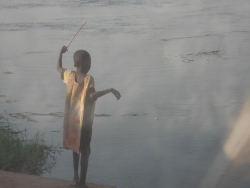FEATURE: Traveling the Wau-Rumbek road
By Manyang Mayom
November 7, 2008 (RUMBEK) – The journey from Rumbek to Wau takes five and a half hours by car to cover just 138 miles (222 km).

The trek passes through three states, Lakes, Warrap and Western Bahr El Ghazal, where guns in the hands of civilians are still found anywhere, whether in the cattle-camps or the towns.
In the wake of the southern government’s decree to disarm all communities between June and December 2008, some states have effectively ignored the order, like Unity state and Lakes state, where soldiers in the Sudan People’s Liberation Army (SPLA) misused their authority to disarm in September, resulting in looting and casualties in Rumbek.
The youth of Cueibet County, northwest of Rumbek, have kept their guns and form cattle-raiding parties.
Cars and lorries with their state license plates travel the road, hindered by mud and occasional roadblocks between Lakes state and Warrap state, where the road passes near Cueibet County centre, some six miles (10 km) from the hometown of Lakes Governor Lt. General Daniel Awet Akot, who hails from a small village in Mayath payam.
There are more illegal guns in Warrap state, especially in Tonj, midway between Rumbek and Wau, where firearms are seen on the streets in the hands of youth and men without military uniforms who call themselves soldiers.
WATER
There is a high-running flood in Cueibet County which destroyed at least 12 villages. All crops and animals face scarcity and more than 100 people are reported to have fled their homes due to the flood.
Nevertheless, now at the end of the rainy season, in some ways the quality of life in Cueibet County seems to be getting better.
Fish, slung from poles, dry by the Bhar-Gel River in the western part of Cueibet County.
Children swim in the river and the streams, though the waters threaten to drown small children. A great number of children in the Bhar-Gel River and all men are found neck-deep, wearing no clothes.
Fish are displayed along the roadside with simple prices, attracting both poor
and rich customers.
The communities in Lakes, Warrap and Wau fear when the rainy season reaches them: symptoms of common diseases always multiply within the society.
Wau has good healthcare equipment, whereas Lakes and Warrap are still kick-starting the foundation of a healthcare system.
ROADS
There is a great no man-lands between Warrap state and Lakes state with only one hand-pump serving travelers with safe water.
The roadwork is sorely needed: a big truck belonging to a businessman overturned between Wau and Tonj.
The UN Joint Logistics Centre (UNJLC) indicates in an October update that the Government of Southern Sudan is engaging to construct nicer roads throughout Southern Sudan.
Roads are bad between Warrap state, Lakes state and Western Bahr El-Ghazal state. There are no tarmac roads. But only in Western Bahr El-Ghazal there are tarmac roads and good hospitals, including a few health centers.
According to the Government of Southern Sudan (GOSS), development policy is intended to benefit all ten states of Southern Sudan; there is ongoing road maintenance from Rumbek to Yirol, a distance of 112 miles (180 km), with funding from Japan, and from Farasika to Rumbek 124 miles (200 km) also with funding from Japan.
From Tonj to Rumbek, 75 miles (125 km) of ongoing road maintenance is funded by GOSS and implemented by World Food Programme.
There is also road rehabilitation planned for 55 miles (90 km) of road between Warrap town and Wau in Western Bahr El-Ghazal state. Even some feeder roads are being rehabilitated, like the Kuajiena road, a project implemented by ACTED.

Mr Famous Big_Logic_Boy
FEATURE: Traveling the Wau-Rumbek road
Mr Mayom if your a decent man with civicalise behavior you better come to Greater Equatoria, forget about those people of Lake state, Warrap, Jungle and whatsoever on the north of Equatoria. Those will never come to human characters may be in 500 years ahead but not now. They desrve food and cattle as their only thing in life. Just forget they are the fivth people on the earth. We better describe them with “Junglese” in fact they are back (stone age) in their mind. I have been requesting them to check help from the civicalised Equatorians, but none of them has ever turn up, so as they enjoy their lives, It is up to them. See how the bor are enjoying themselves with their peace with brave, wise and civicalised Mundari.